|
|
|
Sort Order |
|
|
|
Items / Page
|
|
|
|
|
|
|
| Srl | Item |
| 1 |
ID:
105482
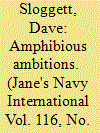

|
|
|
| 2 |
ID:
129942
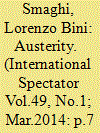

|
|
|
|
|
| Publication |
2014.
|
| Summary/Abstract |
Policymakers in advanced economies tend to postpone reforms and budgetary adjustment, which are politically costly, until the deterioration of financial market sentiment makes these measures unavoidable. Such a strategy is economically costly and politically dangerous. It is costly because once market sentiment deteriorates confidence can be restored only through drastic and much more painful measures. Austerity can be avoided only with a credible reform agenda. The strategy is also dangerous because the argument that "there is no other alternative" cannot be repeated indefinitely by governments that fail to act earlier. The risk that citizens may be attracted to populist solutions increases.
|
|
|
|
|
|
|
|
|
|
|
|
|
|
|
|
| 3 |
ID:
119660
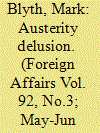

|
|
|
|
|
| Publication |
2013.
|
| Summary/Abstract |
The results of Europe's experiment with austerity are in and they're clear: it doesn't work. Here's how such a flawed idea became the West's default response to financial crises.
|
|
|
|
|
|
|
|
|
|
|
|
|
|
|
|
| 4 |
ID:
155414
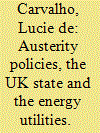

|
|
|
|
|
| Summary/Abstract |
In 2008, the economic downturn coincided with a major shift in the energy sector paradigm. This state of emergency forced the UK government to try to steer the objectives of its major energy players. This crisis put the UK state's capacity to influence its mostly privately-owned energy sector to the test. Using the example of energy utilities, this article aims to explore whether the austerity agenda impacted the relationship between the UK state and its public services. The purpose is to determine whether current multiple crises have forced the UK state to adopt an exceptionally interventionist approach that doesn't tally with the austerity agenda, or whether these crises merely revealed dynamics which had been underlying in the management of its energy utilities since the beginning of the neo-liberal era.
|
|
|
|
|
|
|
|
|
|
|
|
|
|
|
|
| 5 |
ID:
127000
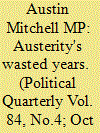

|
|
|
|
|
| Publication |
2013.
|
| Summary/Abstract |
Austerity has become the norm of economic management in the EU, Britain and the USA. In each it is offered as the answer to different problems but everywhere the result is cuts in public spending, higher unemployment and low growth, none of which helps recovery from recession.
Labour's response should not be to endorse or continue austerity but to initiate a Keynesian expansionary stimulus based on borrowing and spending on a huge programme of building public housing for rent. This should be accompanied by a competitive exchange rate, an industrial policy to boost the manufacturing sector and a National Investment Bank, the aim being to expand the production base so that it can pay the nation's way in the World and support the structure and the improvements Labour needs. This makes the choice at the next election the issue of what kind of Britain the electorate wants to see: a low wage, mean economy or a determined attempt to rebuild a stronger nation with a more powerful economy.
|
|
|
|
|
|
|
|
|
|
|
|
|
|
|
|
| 6 |
ID:
133404


|
|
|
|
|
| Publication |
2012.
|
| Summary/Abstract |
Given the enormity of the U.S. national debt and the pressure to reduce Defense spending, surviving the forthcoming era of austerity will require innovative approaches to Department of Defense (DoD) organization and processes. Some of this innovation may require a reversal of previous efforts intended to improve effectiveness and efficiency within the DoD. Preserving operational capacity must be the top priority in any budget-reduction discussion. Unfortunately, the current approaches advocated within the Pentagon, on the Hill, and by influential Beltway think tanks call for reducing spending by trimming inefficient processes, eliminating end strength, and terminating costly acquisitions programs.
|
|
|
|
|
|
|
|
|
|
|
|
|
|
|
|
| 7 |
ID:
105865
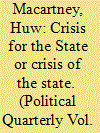

|
|
|
|
|
| Publication |
2011.
|
| Summary/Abstract |
The Conservative-Liberal Democrat government's policy risks turning the financial crisis into a crisis of the state. This article argues that the current trajectory of the British state risks exacerbating the very social antagonisms which it has fought so hard to contain in recent years. It contends that the crisis (2007-09) was a crisis of neoliberalism and yet, paradoxically, neoliberalism-in the form of further depoliticisation and a new politics of debt-is being re-invoked to deal with the post-apocalyptic condition of the British economy. The article suggests that the state lacks the necessary political discourse to secure popular consent and-as a result-is resorting to a more coercive form of political management; and that the effects of austerity are being offset through an increased indebtedness of the British public. Both risk igniting social conflict. In the conclusion several points are indicated for an alternative political agenda.
|
|
|
|
|
|
|
|
|
|
|
|
|
|
|
|
| 8 |
ID:
178026


|
|
|
|
|
| Summary/Abstract |
As critics are quick to point out, the European Union (EU) has entered the crisis phase of its evolution. It could be argued that crisis management is now the EU’s new normal. Dealing with both endogenous (e.g., economic crisis and Brexit) and exogenous crises (e.g., the migrant crisis and COVID-19), the EU is facing a whole new set of challenges that has the potential to destabilize the complex institutional balance that has maintained the process of European integration over the last 70 years. In this environment of rapid responses, gender+ equality has frequently been compromised. As we argue in this article, the implications of this backsliding are grave not only for equality but also for the European Union as a whole. Drawing on Walby’s concept of gender regimes and social transformation, we consider current crises and the EU’s responses to those crises to highlight potentially dangerous shifts in the European gender regime. With crisis response increasingly supporting a neo-liberal gender regime, the current state of perpetual crisis in the European institutions does not bode well for the future of equality.
|
|
|
|
|
|
|
|
|
|
|
|
|
|
|
|
| 9 |
ID:
103296


|
|
|
|
|
| Publication |
2011.
|
| Summary/Abstract |
The history of British defence reviews has been one of repeated disappointment: a cycle in which policy failure is followed by a period of inertia, giving way to an attempt at a new policy framework which is then misimplemented by the defence leadership. Each failed defence review therefore sows the seeds of its successor. With this in mind, in 2010 the new coalition government embarked upon an altogether more ambitious exercise: a strategy review comprising a National Security Strategy and a Strategic Defence and Security Review. This article suggests, nevertheless, not only that the 2010 strategy review looks likely to follow past performance, but also that it is coming unstuck at an unprecedented rate. This is a pity since the 2010 review had much to commend it, not least the adoption of a risk-based approach to security and defence policy-making. What is the explanation for this outcome? Is it that the British have, as some have suggested, lost the ability to 'do strategy', if ever they had it? The authors offer a more nuanced understanding of the policy process and argue that the coalition government in fact has a very clear and deliberate strategy-that of national economic recovery. Yet the coalition government cannot allow national defence and security to fail. The authors conclude with an assessment of the options open to the defence leadership as they seek to address the failing 2010 strategy review and suggest a variety of indicators which will demonstrate the intent and seriousness of the political, official and military leadership of the Ministry of Defence.
|
|
|
|
|
|
|
|
|
|
|
|
|
|
|
|
| 10 |
ID:
185632
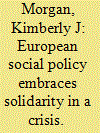

|
|
|
|
|
| Summary/Abstract |
Governments in Europe responded to the COVID-19 pandemic by expanding their welfare systems to protect health, jobs, and incomes. The varied initiatives embody the principle of solidarity and demonstrate how welfare programs serve as a form of collective insurance against risk. But the twin health and economic crises also exposed gaps in coverage for many, including migrants and gig economy workers. Fiscal austerity, enforced by the European Union, has long constrained efforts to close those gaps.
|
|
|
|
|
|
|
|
|
|
|
|
|
|
|
|
| 11 |
ID:
155415
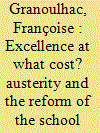

|
|
|
|
|
| Summary/Abstract |
The reform of the school system, which has been conducted by the Coalition and Conservative governments since 2010, has largely been austerity-driven. In spite of the governments’ pledge to protect their budgets, schools have been severely hit by spending cuts. The reform programme has itself been integral to the fiscal consolidation plans by promoting a more cost-effective system of state schooling. This article discusses the relationship between austerity and reform, and looks at the consequences for the concept of public service. Some specific aspects of the new institutional framework are examined, especially the creation of an independent state sector made up of academies and free schools, which has entrenched the involvement of private sector firms in education. The overhaul of the school system, which started nearly thirty years ago, has now reached a new decisive stage. However, considering the complex relationship between multiple actors and the opposing forces at work, one cannot say with any certainty that it will cause the demise of public service state education.
|
|
|
|
|
|
|
|
|
|
|
|
|
|
|
|
| 12 |
ID:
145252
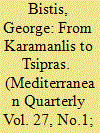

|
|
|
|
|
| Summary/Abstract |
The year 2015 started with a great promise for austerity-harmed people in Greece, but within a few months the promise began to fade as reality sunk in. It was a year that the Coalition of the Radical Left (SYRIZA) achieved a historic electoral triumph in Greece. SYRIZA came to power promising to end the austerity era. However, from its first days in office, the new government realized that keeping this promise would be a far greater challenge than winning the election. Cancelation of the austerity measures required renegotiation of Greece's bailout loans, loans that were conditional on Greece's implementation of these measures. Given that the European lenders had their reasons for setting things up this way, it was not long before Greece's strong anti-austerity drive set the country on a collision course with the eurozone. The negotiations between the two sides are examined in this essay through the perspective of Greece's half-century-long relationship with the European Union and against a backdrop of personal observations and comment, relevant public sentiments, and critical events defining each period discussed.
|
|
|
|
|
|
|
|
|
|
|
|
|
|
|
|
| 13 |
ID:
125896
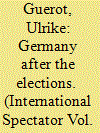

|
|
|
|
|
| Publication |
2013.
|
| Summary/Abstract |
As long as Angela Merkel remains chancellor, most Germans seem to be in no rush to find a coalition. This is why the coalition negotiations have been going on for weeks (and may only conclude when this journal goes to print). Nevertheless, the elections have shaken up the German political landscape: the Liberals (FDP) are out of the Bundestag for the first time since 1949 and the euro-sceptical Alternative for Germany (AfD) is in. With the Left Party still outside of the 'consensus spectrum', the Conservatives (CDU), Social Democrats (SPD) and Greens are the only parties eligible for government in either a grand coalition (CDU/SPD) or a Black-Green coalition (CDU/ Greens). But the SPD's reluctance to enter into a grand coalition a second time, after the disastrous results for the party in 2005-09, led many to hope for an innovative progressive-conservative U-turn in Germany, meaning a Black-Green coalition. Indeed, for a moment it seemed like the CDU and the Greens would dare the impossible after what had been called a "fruitful and harmonious exploration". But in the end, it is going to be a grand coalition again, with the likely effect for Europe that austerity will be softened a bit - but in essence, German European policy will remain as it is, slow and reluctant.
|
|
|
|
|
|
|
|
|
|
|
|
|
|
|
|
| 14 |
ID:
186534
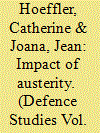

|
|
|
|
|
| Summary/Abstract |
While much scholarship takes austerity-driven spending cuts as evidence of policy change, this paper shifts the focus to interrogate whether these budgetary cuts lead to actual policy change and if so how. Scholarships on institutional change and public policy illuminate how state actors mediate policy change through coping strategies, i.e. strategies by which state actors try to minimize budget decreases’ negative impacts on policy. Taking French Defense Policy as an unlikely case of policy change, we show that state actors have adopted three types of coping strategies to minimize the spending cuts’ impact: compensation, delaying, and re-categorizing acquisition procedures. These coping strategies have however contributed to a process of incremental change, which most of time is non-cumulative and creates additional policy problems. This article contributes to a better understanding of change underway in defense policies, but also more generally to literatures pertaining to austerity and policy change.
|
|
|
|
|
|
|
|
|
|
|
|
|
|
|
|
| 15 |
ID:
131440
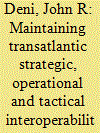

|
|
|
|
|
| Publication |
2014.
|
| Summary/Abstract |
With the end of major combat operations in Afghanistan, how will the North Atlantic alliance maintain the unprecedented levels of interoperability developed over the last decade? One of the most effective means of building and maintaining interoperability-the forward-based presence of US military forces in Europe- has shrunk significantly over the last 25 years and is likely to shrink further in the coming years, meaning it will become increasingly difficult for American and European military forces to operate side by side. Nevertheless, the United States continues to look to its allies in NATO as the primary partners in maintaining and promoting common interests around the globe. Additionally, Washington seems more committed than ever to wielding force in a coalition context. In order to help remedy this seeming incongruity, Washington announced in early 2012 a plan to deploy rotationally several hundred troops from the United States to Germany for periodic exercises with European partners and allies. However, it remains unclear whether a rotational model will be sufficient to generate the level of interoperability necessary for US forces and those of its most capable European allies to work seamlessly across the range of military operations. The loss of tactical and operational interoperability threatens transatlantic strategic interoperability, and therefore risks decoupling European and American security policy. To mitigate these challenges, the article discusses several policy steps the United States should consider.
|
|
|
|
|
|
|
|
|
|
|
|
|
|
|
|
| 16 |
ID:
118233
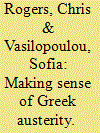

|
|
|
|
|
| Publication |
2012.
|
| Summary/Abstract |
The process of approving a Greek drawing on funds provided by the international community is now familiar. There is concern about the prospect of securing an agreement between the International Monetary Fund (IMF), the European Union (EU), the European Central Bank (ECB), and Greece, which satisfies all parties. This paper suggests that all parties to the agreement have interests in an orderly resolution of the Greek crisis that keeps Greece in the Eurozone. Furthermore, it argues that disagreements and delay before eleventh-hour agreements can best be explained politically. The paper first demonstrates how Greece, the IMF, and the EU each have a clear interest in finding an orderly solution to the Greek crisis that allows it to remain in the Eurozone. It then outlines the incremental nature of the package and its strategic benefit both for the European banking sector, and governments in Greece and the Eurozone more broadly.
|
|
|
|
|
|
|
|
|
|
|
|
|
|
|
|
| 17 |
ID:
133379


|
|
|
|
|
| Publication |
2013.
|
| Summary/Abstract |
Before leaving his position as Secretary of Defense in 2010, Robert Gates offered a wake-up call in a speech to the Marine Corps Association in 2010: "It [is] time to redefine the purpose and size of the Marine Corps." The perception even then was that the Marine Corps had become too big, too heavy, and too far removed from its maritime roots.1
|
|
|
|
|
|
|
|
|
|
|
|
|
|
|
|
| 18 |
ID:
103859
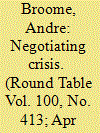

|
|
|
|
|
| Publication |
2011.
|
| Summary/Abstract |
How do small states use international organisations to manage the consequences of exogenous shocks? This article examines this question through exploring how small states negotiate with the International Monetary Fund (IMF) for crisis management support during a period of 'disaster capitalism'. Focusing on the case of Iceland, the article argues that while small states can potentially build scale economies in specialist sectors such as banking, the risks inherent in rapid financial expansion greatly increase their vulnerability to external shocks. In such circumstances, small states are likely to struggle to level the playing field in their attempts to negotiate the constraints and opportunities provided by engagement with the IMF during international crises, when they face higher stakes compared with larger economies and have a narrower policy choice set at their disposal.
|
|
|
|
|
|
|
|
|
|
|
|
|
|
|
|
| 19 |
ID:
118237
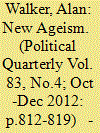

|
|
|
|
|
| Publication |
2012.
|
| Summary/Abstract |
This article takes issue with the apparently entrenched political narrative about ageing and older people which is routinely expressed in both ministerial rhetoric and media headlines warning of the 'burden' of dependency and intergenerational strife. It argues that this narrative is rooted in the potent combination of ageism and neoliberalism and is being ramped-up by the Coalition Government's austerity fixation. The social and political risks of this omnipresent narrative are discussed as is the persistence of the case that generational conflict is inevitable, in both the UK and US, despite the complete absence of any evidence supporting it. The article finishes by urging action to alter the course of both individual and societal ageing and so avoid future spending demands as well as improving the quality of life of current and future generations of older people.
|
|
|
|
|
|
|
|
|
|
|
|
|
|
|
|
| 20 |
ID:
112064
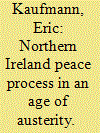

|
|
|
|
|
| Publication |
2012.
|
| Summary/Abstract |
The steady drip of dissident Republican attacks forms the backdrop to this special issue of Political Quarterly. Moreover, this comes at a time of economic austerity, when Northern Ireland faces unprecedented cuts to its public sector-dominated economy. The economic crisis in the South adds an additional layer of uncertainty to the picture. In the past, economic deprivation has been associated with conflict in Northern Ireland and elsewhere. Might the peace dividend and constitutional settlement which have underpinned the Northern Ireland 'miracle' since 1994 be under threat? Or is there now sufficient momentum in both of Northern Ireland's main ethnic communities that such an outcome can be safely averted? This paper summarises the thinking of our symposium and special issue on this topic, updating our picture of the Northern Ireland peace process.
|
|
|
|
|
|
|
|
|
|
|
|
|
|
|
|
|
|
|
|
|